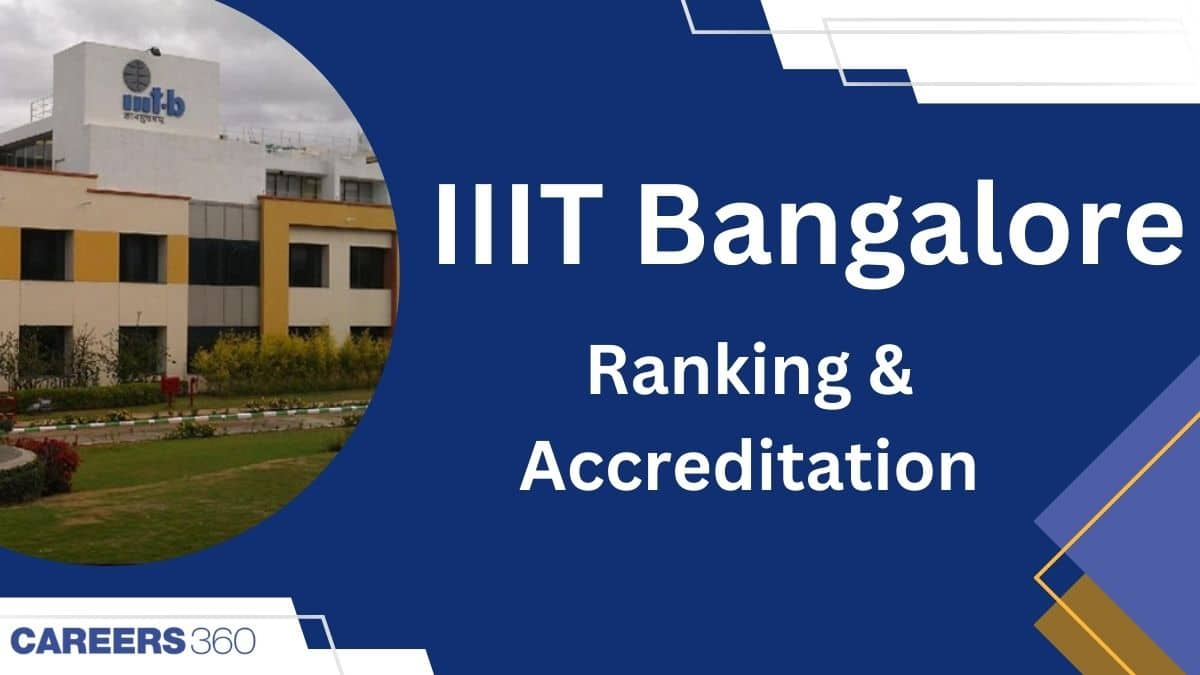MIT World Peace University B.Tech Admissions 2026
Highest CTC 44.14 LPA | UGC Approved | 1600+ Recruiters | 100% Placement
The International Institute of Information Technology Bangalore (IIIT Bangalore) is a technology institute known for academic excellence, research, and industry collaboration. IIIT Bangalore has consistently ranked among India’s best institutions. In the IIIT Bangalore NIRF 2024 rankings, it secured 74th place in the Engineering category, while India Today 2024 ranked it 9th among India's Best Private Technical Universities. The institute is also accredited by NAAC with an A+ grade and a CGPA of 3.37 out of 4, underscoring its high academic and research standards. These rankings and accreditations reaffirm IIIT Bangalore’s position as a leading institution shaping India’s technology landscape. Read on more to learn about IIIT Bangalore's ranking and accreditations in recent years. These insights will help you decide whether it's your go-to choice.
This Story also Contains

Several national ranking bodies have evaluated IIIT Bangalore across various categories. IIIT Bangalore achieved a remarkable ranking of 74 out of 1463 engineering colleges in India, in the National Institutional Ranking Framework (NIRF), and 10th out of 173 by IIRF. IIIT-B stands the 2nd best among all the 32 IIITs. The achievement reflected IIIT-B’s unwavering commitment to excellence in various areas, such as teaching, learning, resources, research, professional practices, graduation outcomes, facilities for physically challenged students, and perception ranking.
The table below provides an overview of IIIT Bangalore’s rankings in 2024 and previous years for the engineering category.
Year | Engineering Category |
|---|---|
2024 | 74 |
2023 | 74 |
2022 | 81 |
IIIT Bangalore has earned several prestigious awards and recognitions for its contributions to academics, research, sustainability, and digital public infrastructure. Below is a structured overview of IIIT Bangalore’s awards and achievements.
Field | Awards and Accreditations |
|---|---|
Sustainability & Green Initiatives |
|
Digital Public Infrastructure & E-Governance |
|
Research & Innovation |
|
Academic & Student Success |
|
An institution’s rank is also decided by the infrastructure and facilities offered to its students. The institution offers various facilities to ensure a comfortable academic and residential experience, adding to IIIT Bangalore’s ranking and recognition in diverse fields. IIIT Bangalore facilities include:
Hostels for boys and girls
24/7 internet
Laboratories
Library
Medical support
Gymnasium
Cafeteria
Auditorium
And much more
Also, check:
Frequently Asked Questions (FAQs)
Yes, the institute provides merit-based, need-based, and PwD scholarships, along with AICTE fellowships for GATE-qualified students.
Top IIIT Bangalore recruiters include Google, Microsoft, Amazon, Cisco, Dell, and IBM, offering high-paying job opportunities.
Yes, IIIT Bangalore is UGC approved and accredited by NAAC.
On Question asked by student community
In JEE Main 2026, a 95 percentile roughly corresponds to ranks between 35000 and 75000, making it a good score for NIT admissions. The JEE Main session 1 results were released on 16 February 2026.
With the 92.440889 %, you are qualified for the JEE Advanced exam, but getting a seat in NIT and IITs will be difficult unless you apply through Home state Quota.
Based on the previous year's trends, an 80-85 percentile in JEE Main typically corresponds to a score of approximately 55 to 62 marks. for more information you can read this article - JEE Main 2026 College for 80-90 Percentile
You can check the detailed cutoff marks for IIIT Dharwad here .
Among top 100 Universities Globally in the Times Higher Education (THE) Interdisciplinary Science Rankings 2026
Recognized as Institute of Eminence by Govt. of India | NAAC ‘A++’ Grade | Upto 75% Scholarships
Among top 100 Universities Globally in the Times Higher Education (THE) Interdisciplinary Science Rankings 2026
70th University Ranked by NIRF | 80th Engineering Rank by NIRF | Accredited by NBA and NAAC A+
Last Date to Apply: 28th Feb | Ranked #43 among Engineering colleges in India by NIRF | Highest Package 1.3 CR , 100% Placements
NAAC A+ Accredited | Among top 2% Universities Globally (QS World University Rankings 2026)